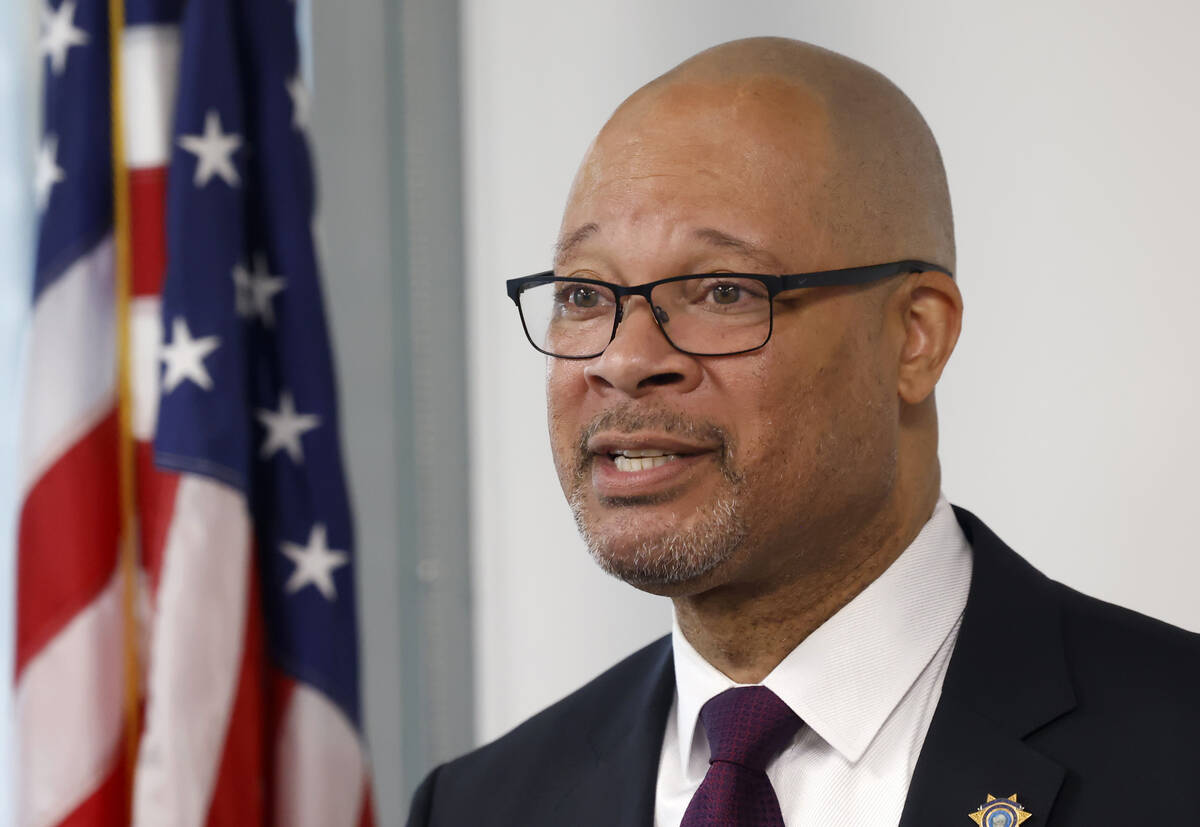Metro wants to intervene in Rudin lawsuit, suggests AG wouldn’t represent interests
The Metropolitan Police Department wants to intervene in Margaret Rudin’s wrongful conviction lawsuit, based, in part, on a suggestion that Attorney General Aaron Ford’s office “would not adequately represent” the department’s interests.
Rudin filed her lawsuit against the state in May 2024, seeking a certificate of innocence and wrongful conviction compensation. She was convicted in 2001 of murdering her husband but had her conviction overturned decades later on the grounds of ineffective assistance from her former defense lawyer. She said in the suit that she had no involvement in her husband’s murder.
“As with many wrongful convictions, Margaret Rudin’s wrongful conviction was based on flimsy evidence, overzealous and inexperienced detectives, and a media frenzy around the crime which led to what even the presiding judge would call in later documentary interviews a ‘circus’ atmosphere of her trial,” Rudin’s suit said.
Attorneys for the Metropolitan Police Department denied those allegations and filed the motion to intervene on June 10, arguing that “this matter may impact interests held by (Metro).”
A section of the motion to intervene also appears to be aimed at Ford’s office: “The current parties would not adequately represent (Metro’s) interests,” the motion said. The filing added that the state, represented by the attorney general, and Metro have different objectives in the case: determining whether Rudin is innocent versus responding to her claims against police personnel.
If granted, the motion would allow police to essentially insert themselves into the litigation.
Experienced attorneys think the filing could be prompted by concern the attorney general won’t be a “cheerleader” for the department, a recent case in which a federal jury awarded a woman named Kirstin “Blaise” Lobato $34 million after finding detectives fabricated evidence against her or a desire to avoid a future federal lawsuit from Rudin.
Metro declined to comment. Lyssa Anderson, one of the attorneys who filed the motion, also declined to comment. Adam Breeden and Corrine Murphy, lawyers for Rudin, did not respond to requests for comment. The attorney general’s office declined to comment.
David Owens, an attorney for Lobato who runs the University of Washington’s Civil Rights and Justice Clinic, said if Metro is allowed to intervene in Rudin’s case, it could obstruct similar cases in the future.
“The effect would be to make it harder for an innocent person to get a certificate of innocence and to probably slow down the process of their getting one,” he said.
Police said their request “is for assistive purposes, not to burden the court or parties.” Rudin’s attorneys opposed Metro’s motion in a Tuesday filing, calling the department “a wolf in sheep’s clothing.”
What is Metro’s motive?
Defense attorney Robert Langford, a former prosecutor who has worked on wrongful conviction cases, said prosecutors must look at a case critically, which is sometimes uncomfortable for law enforcement.
“I think they’re worried that the attorney general is not going to go in there and just be a cheerleader for Metro, but that’s not what the process calls for,” said Langford, who had not heard of tension between Metro and Ford’s office.
In his view, police give up their responsibility to a case when they pass it to the district attorney’s office. “They’re just trying to do something because they’re afraid they might get some criticism and it’s a shame they’re that afraid,” he said.
Scott Coffee, another experienced defense lawyer, questioned how Metro would have the authority to jump into the case.
“Why does Metro have independent standing in this?” Coffee said, adding, “They’re going outside the elected chain of command.”
He said the overturning of Rudin’s case suggested something was done wrong.
“Obviously, Metro’s trying to protect something,” said Coffee. “Either they’re trying to protect their conviction or they’re concerned about money.”
Rudin’s lawyers said Metro “wants to control how the State resolves these claims, not out of some altruism but to protect its own officers and Department from being sued for civil rights violations.”
Langford said he had not heard of any police misconduct in Rudin’s case.
Retired Detective Phil Ramos, who investigated Rudin’s case, said he could not comment because he expects to testify in her pending suit. James Vaccaro, another retired detective who worked the case, could not be reached for comment.
Steve Grammas, president of the Las Vegas Police Protective Association, which represents Metro officers, said the department may simply have more confidence in their attorneys than Ford.
In its motion, Metro cited wrongful conviction cases where outside parties, including police, were allowed to intervene.
But Owens said police officers are usually not permitted to intervene.
“The innocence compensation proceeding is just about one thing: whether or not somebody is innocent,” he said. “The petitioner doesn’t have to prove police misconduct. The petitioner doesn’t have to prove that certain officers should be liable or violated their rights.”
Lobato’s case
Owens believes the events of Lobato’s case prompted the motion to intervene in Rudin’s. Attorneys for Rudin agreed, writing in court documents that Metro’s “efforts appear to be a direct result of a large verdict against LVMPD’s officers in another matter involving another wrongfully convicted inmate, Kirstin ‘Blaise’ Lobato (who Rudin actually knew in prison).”
In 2001, a 44-year-old man named Duran Bailey was found dead in west Las Vegas with blunt force injuries, stab wounds and a severed penis.
Police connected Lobato to the slaying after interviewing a witness who claimed to have heard Lobato was attacked in Las Vegas and cut a man’s penis off.
Lobato testified she actually used a knife to slash at the lower body of a man who tried to sexually assault her more than a month before Bailey died. She spent over 15 years behind bars and was granted what would have been her third trial after new evidence showed she was with her parents in Panaca when Bailey was killed.
Prosecutors decided to drop the charges. Lobato settled a state case with Ford’s office. She received $900,000 and a certificate of innocence.
During Lobato’s federal trial in December, Metro released a letter signed by Clark County Sheriff Kevin McMahill and Clark County District Attorney Steve Wolfson that questioned why Ford’s office settled with Lobato so close to her federal trial and indicated “key parties involved in her prosecution” continued to believe she was guilty.
McMahill said in the letter that he and Wolfson “recommend an investigation into the representations made to the court and to your office by Lobato.”
Ford responded that that Lobato “met the preponderance of evidence standard used in these cases” to show she wasn’t in Las Vegas when the killing happened.
Following reporting on the letter, U.S. District Judge Richard Boulware issued a gag order on Metro and other parties to the case.
Wolfson did not respond to a request for comment.
Owens is still upset about the letter, which he said was baseless and unprofessional. He also suggested it could be related to the way Metro sees Rudin’s case.
“Metro just publicly accused me of unethical conduct in a baseless manner in relationship to a state court proceeding exactly like this and so I would be shocked if there were no relationship between what Metro’s thinking about this particular case and the baseless allegations it made against me in Lobato,” he said.
The process
There are two separate remedies in wrongful conviction cases, attorney Lisa Rasmussen said.
A person can seek an innocence declaration and monetary compensation, Rasmussen said, and that’s separate from a civil rights suit declaring liability.
Owens said a plaintiff is able to file a federal civil rights action without the certificate of innocence, but a determination of innocence could lead to a higher dollar jury award.
Langford and Jess Marchese, an attorney who practices in state and federal court, said police may be trying to head off a federal lawsuit with their motion to intervene.
Some attorneys are skeptical Rudin will be able to obtain a certificate of innocence.
Langford said there was probable cause Rudin was guilty of murder.
“She just wants to have the full ability to sue,” he said. “Good luck with that.”
Even attorney Greg Mullanax, who represented Rudin in the federal case that led to her conviction being vacated, said he did not think she would be able to receive a certificate of innocence because her conviction was vacated based on ineffective assistance of counsel.
He believes Rudin is innocent and saw Metro’s motion to intervene as a defensive move, but also thought the department made “a compelling argument.”
“It sounds like they want to protect their reputation or something,” he said.
Contact Noble Brigham at nbrigham@reviewjournal.com. Follow @BrighamNoble on X.






















